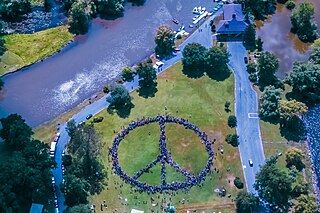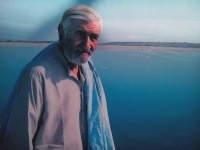
Pashtuns, also known as Pakhtuns, Pashteens or Pathans, are an Eastern Iranian ethnic group primarily residing in southern and eastern Afghanistan and northwestern Pakistan. They historically were also referred to as Afghans until the 1970s, after the term's meaning had become a demonym for members of all ethnic groups in Afghanistan.

Restorative justice is an approach to justice that aims to get offenders to take responsibility for their actions, to understand the harm they have caused, to give them an opportunity to redeem themselves, and to discourage them from causing further harm. For victims, its goal is to give them an active role in the process and to reduce feelings of anxiety and powerlessness.

Abdul Ghaffār Khān BR, also known as Bacha Khan or Badshah Khan, and honourably addressed as Fakhr-e-Afghan, was a Pashtun independence activist, and founder of the Khudai Khidmatgar resistance movement against British colonial rule in India. He was a political and spiritual leader known for his nonviolent opposition and lifelong pacifism; he was a devout Muslim and an advocate for Hindu–Muslim unity in the subcontinent. Due to his similar ideologies and close friendship with Mahatma Gandhi, Khan was nicknamed Sarhadi Gandhi. In 1929, Khan founded the Khudai Khidmatgar, an anti-colonial nonviolent resistance movement. The Khudai Khidmatgar's success and popularity eventually prompted the colonial government to launch numerous crackdowns against Khan and his supporters; the Khudai Khidmatgar experienced some of the most severe repression of the entire Indian independence movement.

Bannu District is a district in the Bannu Division of the Khyber Pakhtunkhwa province of Pakistan. Its status as a district was formally recorded in 1861 during the British Raj. This district constitutes one of the 26 districts that collectively form the Khyber Pakhtunkhwa province. It borders North Waziristan to the northwest, Karak to the northeast, Lakki Marwat and Bettani to the southeast, and South Waziristan to the southwest. It is represented in the provincial assembly by four MPAs.
A jirga is an assembly of leaders that makes decisions by consensus according to Pashtunwali, the Pashtun social code. It is conducted in order to settle disputes among the Pashtuns, but also by members of other ethnic groups who are influenced by them in present-day Afghanistan and Pakistan.

Eastern Mennonite University (EMU) is a private Mennonite university in Harrisonburg, Virginia. The university also operates a satellite campus in Lancaster, Pennsylvania, which primarily caters to working adults. EMU's bachelor-degree holders traditionally engage in service-oriented work such as health care, education, social work, and the ministry. EMU is especially known for its Center for Justice and Peacebuilding (CJP), particularly its graduate program in conflict transformation.

Parachinar is a large town which is the capital of Kurram District in the province of Khyber Pakhtunkhwa, Pakistan. It is mainly inhabited by Pashtun.
John Paul Lederach is an American Professor of International Peacebuilding at the University of Notre Dame, Notre Dame, Indiana, and concurrently Distinguished Scholar at Eastern Mennonite University. He has written widely on conflict resolution and mediation. He holds a Ph.D. in Sociology from the University of Colorado. In 1994 he became the founding director for the Center for Justice and Peacebuilding at Eastern Mennonite University where he was a professor. He currently works for the foundation Humanity United.

Swabi District is a district in the Mardan Division of the Khyber Pakhtunkhwa province in Pakistan. It lies between the Indus and Kabul Rivers. Before becoming a district in 1988, it was a tehsil within the Mardan District. 96% of the population speaks Pashto as their first language.
The Pashtun diaspora comprises all ethnic Pashtuns and their descendants who are living outside of their traditional homeland of Pashtunistan, a historic region that is today situated over parts of Afghanistan and Pakistan. While the (erstwhile) Pashtunistan is home to the majority of Pashtun people, there are significant local Pashtun diaspora communities scattered across the neighbouring Pakistani provinces of Sindh and Punjab, particularly in their respective provincial capital cities of Karachi and Lahore. Additionally, people with Pashtun ancestry are also found across India; particularly in Rohilkhand, a region in the Indian state of Uttar Pradesh; and in the Indian states of Gujarat and Rajasthan. Outside of South Asia, significant Pashtun diaspora communities are found in the Arab states of the Persian Gulf, the United States, the United Kingdom, Germany, Iran, Australia, Canada, and Russia.

Peacebuilding is an activity that aims to resolve injustice in nonviolent ways and to transform the cultural and structural conditions that generate deadly or destructive conflict. It revolves around developing constructive personal, group, and political relationships across ethnic, religious, class, national, and racial boundaries. The process includes violence prevention; conflict management, resolution, or transformation; and post-conflict reconciliation or trauma healing before, during, and after any given case of violence.

Howard J. Zehr is an American criminologist. Zehr is considered to be a pioneer of the modern concept of restorative justice.
Gohar and Gauhar are given names and surnames. Gawhar is a given name. Bearers of the name include:

Leymah Roberta Gbowee is a Liberian peace activist responsible for leading a women's nonviolent peace movement, Women of Liberia Mass Action for Peace that helped bring an end to the Second Liberian Civil War in 2003. Her efforts to end the war, along with her collaborator Ellen Johnson Sirleaf, helped usher in a period of peace and enabled a free election in 2005 that Sirleaf won. Gbowee and Sirleaf, along with Tawakkul Karman, were awarded the 2011 Nobel Peace Prize "for their non-violent struggle for the safety of women and for women's rights to full participation in peace-building work."
Saleem Safi is a Pakistani journalist and talk show host for the show Jirga. He specializes in foreign policy, terrorism, Kashmir conflict, Afghanistan conflict and the politics of Pakistan. He is associated with Jang Media Group and hosts an Urdu talkshow on Geo News, called Jirga.
Center for Justice and Peacebuilding (CJP) is an accredited graduate-level program founded in 1994. It also offers non-credit training. The program specializes in conflict transformation, restorative justice, trauma healing, equitable development, and addressing organizational conflict. CJP is housed at Eastern Mennonite University (EMU) in Harrisonburg, Virginia, which describes itself as "a leader among faith-based universities" in emphasizing "peacebuilding, creation care, experiential learning, and cross-cultural engagement." One of the three 2011 Nobel Peace Laureates, Leymah Gbowee of Liberia, earned a master's degree in conflict transformation from CJP in 2007.
Samuel Gbaydee Doe is a conflict, peace, and development professional from Liberia. Doe was a cofounder, with Emmanuel Bombande, of the West Africa Network for Peacebuilding (WANEP), based in Accra, Ghana. This organization focuses on collaborative approaches to conflict prevention and was founded in 1998 in response to the civil wars taking place in West Africa. The organization is known for their work with several regional partners such as the Economic Community of West African States (ECOWAS) and the African Union’s Economic, Social, and Cultural Council (ECOSOCC).

Hizkias Assefa (1948) is a conflict mediator known widely in Africa for his non-aligned work as a consultant who has mediated in most major conflict situations in sub-Saharan Africa in the past 20 years, as well as in a dozen countries elsewhere. He is also a professor of conflict studies. Of Ethiopian origin, he is based in Nairobi, Kenya. He was one of the founding faculty members in 1994 of the Conflict Transformation Program at Eastern Mennonite University.

Syed Pir Gohar Ali Shah, also known as Shaer-i-Aman, was a Pakistani poet, songwriter, critic and freedom activist who primarily wrote poems in Pashto language. He is also credited with contributing to the independence movement of Pakistan. He sometimes wrote articles and essays under pen names such as Shilmani and Silani.
The inaugural meeting of the Pashtun National Jirga, also known as the Bannu Jirga, was held at Mirakhel Cricket Ground in Bannu, Khyber Pakhtunkhwa from 11 to 14 March 2022 to discuss the critical issues faced by the Pashtuns in Pakistan and Afghanistan. It was attended by about 5,000 delegates, including politicians, tribal chiefs, researchers, clerics, religious minorities, women and human rights activists.












